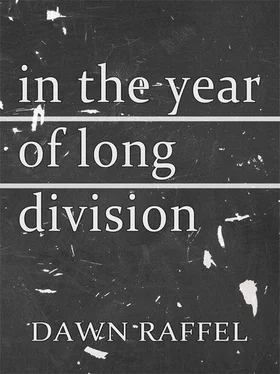It sounded aggressive.
“Turn it down, please,” Vera said.
The men were fixing drinks. They were crouching, squatting, improving the position of the logs.
The men were laying odds.
“Lower,” Vera said. “Down.”
“What’s that I smell?” one of the men, one of the husbands — Rita’s — said. The husband’s name was Dolan.
Dinner was casual, all in one pot. Ladled out. Con carne, Vera said. Delicious, Dolan said. Sweet, Rita said. There was custard in long-stemmed glasses, suited, it seemed to Rita, for something else.
Vera’s husband spoke. His voice was unexpected for someone of his size. “Kindling,” he said. “That is the honest-to-goodness difference.”
“More?” Vera said, kept saying all during dinner. “Who wants more?”
“Turn that tape there,” Dolan said.
The day had made them famished, or so they had concurred.
“Look at that wrist,” Vera said. “Poor dear.”
Rita looked at her spoon, at the mound of vanilla. She opened her mouth.
“Tomorrow,” Dolan said, “just grab the thing. Don’t think about it moving.”
“The trick is not to think,” Vera said.
Vera’s husband reported a prediction, which had to do with weather.
“Will it?” Dolan said.
Vera said, “It’s not supposed to stick.”
Rita swallowed the custard, washed it down. Vera’s woolly pullover felt damp on Rita’s body, rearranged (the women, in fact, were unalike in their proportions). “Maybe a little,” Rita said. She lifted her tumbler. “Maybe a drop,” she said. “Maybe a little, one drop more.”
Vera brought a finger to the coil of her hair. A strand came loose. Her forearm seemed quite pale in the light of the fire. What she said was, “Sorry, love.”
“NICE try,” he said.
“Which?” she said.
They were somewhere other than under the quilt. She was moving to the bureau. It was one of those bureaus with a runner — oak, old solid oak; a person could rap it with a knuckle and know the way it was, and on it, all along the runner, which was certainly lace, there were feminine necessities: pins and lotions, scissors, a genuine boar bristle brush, a vial, a bottle with a V .
“Watch out,” he said.
“I’m prone,” she said.
His hands raised. “Look at you,” he said. “Will you look at you?” he said.
There were paintings of nature, of natural scenery, in oil and in water on the walls.
“Smell,” she said. “What do you think she keeps in here?”
They were thick, his hands.
“Don’t,” she said. She freed her wrist.
“Don’t hurt yourself,” he said.
THE house was of a definite type, quite common in the region: cream outside, off-white, with dark wood trim — chocolate, Vera called it, a house you could eat, styled as if it was on another continent. Out in the front was an empty brook, and past the empty brook, a slope. The slope was clear of trees. On fine cold days, there was, from the house’s frontside windows, visible wintry action: the hint of a cap, bright, swift, the fluent suggestion of limbs — a leg’s bend, an arm’s crook — all headlong locomotion.
Inside was warm. No draft blew in. The bird in the clock plucked the accurate time. Nothing creaked. The house, despite appearances, was not, in fact, old — Vera had ordered it built. The plumbing was a dream, she said. The paint was new. The walls were new, and thin as injured skin.
“RISE and shine,” Vera said. “Up and at ‘em,” Vera said, or something that sounded to Rita like that, to that effect. Everybody already was well up. Predictable scrubbings and flushings had occurred, as Rita was aware.
Rita had troubled with her eyes, with the shape and the blush of her lips, the general set of her face.
There was an odor of fried cured meat.
The men were in the nook.
“Sit,” Vera said from somewhere in the kitchen.
Rita took a place.
“Really, I don’t need help,” Vera said.
The men had been betting on what sounded to Rita like a sporting event. Dolan hit the table. “You,” he said. “You’ll eat those words.”
The shades had been lifted, and the day appeared fair. There were people on the slope.
Rita wore pants, and Vera, entering the nook, did too; the men did, too.
“Who wants what?” Vera said. She was holding a piled-high platter.
“I do,” Dolan said.
“I’m good,” said Vera’s husband.
Rita doubled over a part of a sleeve, which was not the right fit.
“Wrong answer,” Vera said.
“It isn’t getting better,” Rita said.
“Here, let me see,” Vera said. She had put down the platter and was holding Rita’s wrist to the light.
“I would say worse,” Rita said.
Vera’s husband was facing the window. “Powder,” he said. It seemed that he had something in his mouth. “As I suspected,” he said.
“Definitely worse,” Rita said. “Is there anything at all in the house that I can use?”
Vera’s husband was starting to clean Rita’s plate — what was left, what she had not touched. The plates were rimmed around with maroon.
“Leave it alone,” Vera said. “Don’t pick.”
Equipment was discussed — skis, poles, snacks.
“This color,” Rita said.
Vera sniffed.
Somebody handed Rita a parka.
“Do we wear the same scent?” Vera said.
The men were yanking boots over socks.
“You’re going to try it again,” Dolan said. “Just do as I said. Just grab the rope.”
“For God’s sake,” Vera said.
“I would say yes,” Rita said. “The same.”
Vera’s husband adjusted a cap. “Isn’t that what they say?” he said. “What’s the expression? Back on the horse?”
Rita was looking at Vera, who looked to be examining the clamor of parquet.
“Isn’t that what they say about what?” Rita said. “And what about it?”
TALL skis leaned against the house, tips crossed, poles slung by straps. Ice-rimed boots stood dripping by the door. The door was locked. There were glasses — stemmed, drained, or holding a hint of reddish liquid, drying, going sour in the nook. A glaze was on the window. The window was dark, the shades left carelessly up. Wraps were pegged haphazardly: parkas with thick down mitts stuffed down to rest in sleeves, fat hoods that left the side view blind. A tape had reached its end on the deck. In the grate, twigs sighed. Orchids imported from somewhere drooped. There was a leak in the sink, a clutter of dishes; a trail of thermal socks lay in the hall. The den was shut. A quilt was on the rug at the foot of the bed in the bedroom, night things, day things, soiled pairs of pants.
The mark — of the sort an open sore would leave on sheets — was scarcely perceptible.
Rita was angled on an arm. “Where are you?” she said.
The bird in the clock came out. Rita heard a masculine voice, what she took to be masculine speech. “Here,” she said.
She rose, walked, opened a door.
A name was called.
A weak light fell.
Rita felt a sound fly out of herself. She touched herself, the base of her neck.
Pale at the end of the hall, arms seemingly boneless, the body a smear of flesh and chiffon, Vera appeared. “Dolan?” she said.
Rita wet her lips.
“Who is it?” Vera said. “Which one of the three of you is it?”
“WHAT did you think you were doing?” he said.
“Parched,” she said.
“Parched?” he said.
Rita took a sip.
“Be decent,” he said. “It’s the middle of the night.”
Rita put the sweaty-feeling glass on the unprotected table by the side of the bed. “How did I do today?” she asked. She leaned against the board, carved oak.
“You will notice I’m alive,” she said.
Читать дальше












